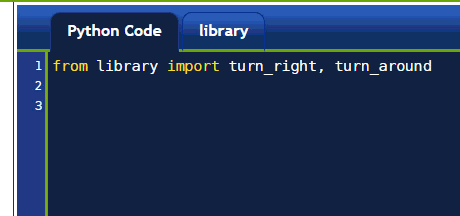When programmer make use of a given function in different programs, rather than redefining it in each program they write, they put them in special programs called libraries and they have a way to ensure that their other programs can use the functions that are found in the library.
You are likely going to use the function turn_right() a lot! Instead of rewriting it each time, I suggest that you will click on the library tab and write it there. Oh, and you should also write turn_around() there as well.
Then, when you want to use the functions defined in your library, you will simply type from library import (followed by the function names, separated by commas) on its own line in the Python Code editor. library is the name that I have chosen to represent the code that is in the library tab. As you will see elsewhere, Python comes with other libraries containing code that you can use.

From that point on, you can use turn_right() and turn_around() as though you had defined them in the Python Code editor.
Instead of importing specific functions, you can simply import the name of the library:
import library
Then, if you want to use a function from the library, you need to add library. in front of its name as in:
library.turn_right()
This is useful if you are using multiple libraries that may have some functions having the same name (but different meaning): by adding the name of the library in front of the function, you know exactly which one is being called.
Occasionally, you might find it useful to use a different name for a function - either because the original name is too long, or because you already have a different function with the same name. In those instances, you can use the keyword as:
from library import turn_right as right
right() # use it
turn_right() # not defined!!!!
Very occasionally, you will find it convenient to use another Python library that contains so many functions that it is very tedious (and difficult to remember) to write the all when doing:
from python_library import function1, function2, function3, ...
and you don’t want to use python_library. in front of every single function. In those instances, you can use the following syntax:
from python_library import *
The * is a shortcut meaning “everything”. As a concrete example, you can try:
from reeborg_fr import *
If you try the above, it will import a French version of all the commands that Reeborg knows. Thus, you could write either the English move() or the French avance() and Reeborg will move forward.